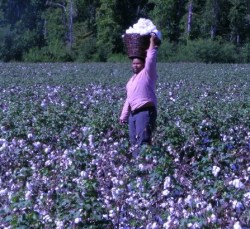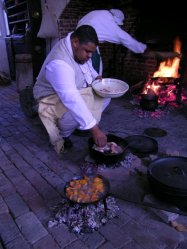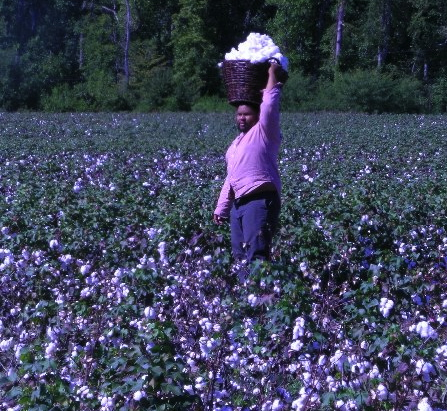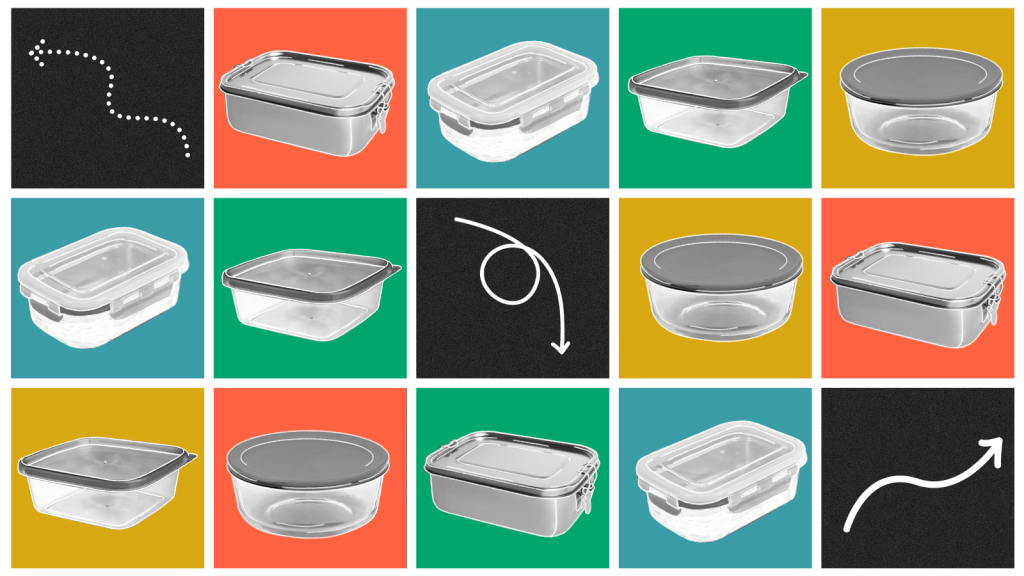
Michael Twitty.
Michael Twitty is about to embark on what he calls the “Southern Discomfort Tour” — a journey to follow his ancestors’ “foodsteps” through the American South.
This self-described writer, culinary historian, and Jewish educator from the Washington, D.C., area will be traveling with a small group for two months by car, from Maryland to Louisiana and back, covering almost 4,500 miles.
In addition to tracing his personal history, Twitty will be speaking, giving cooking demonstrations, and volunteering on farms and for food justice organizations over the course of the trip. He plans, as he puts it, to “make sure that organic, local and sustainable food in Southern communities — particularly that produced by farmers of color — is highlighted and supported.” He also plans to document the journey on his blog, The Cooking Gene.
Twitty’s roots go back through the segregated South to slavery in Virginia, and he also hopes to engage communities in conversation about the region’s fraught history, using the unique and beloved cuisine of the South as a medium for education and reconciliation. We caught up with Twitty as he was fundraising for the tour.
Q. Describe your approach to this project and what kinds of things you’ll be doing along the way.
A. I’ve been planning the road map [for this trip] for 25 out of my 35 years — learning about genealogy, African American history, and slavery. I really wanted to feel that I was not an armchair scholar. [To that end, Twitty has picked cotton and tobacco in the South.] I didn’t just want to do a project about my ancestors and slavery. The food thing makes it unique, because you can talk about it in regards to slavery, race, class, and power. It’s not just a cultural conversation about things that make people mad, it’s a way to do it that brings people together.
We’re going to be working with a couple different community garden groups, and working with African American farmers. And doing historic [cooking] demonstrations.
We’re going to be at a synagogue in Birmingham where there are black churches sharing the same street, and we’ll have this — hopefully — rich discussion about what identity means and how being Southern brings everybody together. I’m also looking for Chinese communities in Mississippi who have been blending Southern produce and African American food traditions with Chinese regional food traditions for years, and no one’s ever thought to ask them, “how do you make that collard green and crawfish stir fry?”
Q. What’s unique about Southern cuisine?
A. It’s the oldest verifiable, continuous American food tradition. Our food is this incredible blend of the earth, the sky, the water, native America, Africa, and Europe. And it just keeps on incorporating new elements, whether they’re Latino or they’re Asian.
Q. What’s the impact of race on how we eat, and how has that relationship evolved over history?
A. There is a really interesting, apocryphal anecdote [that] said that the only day black people were allowed to publicly eat vanilla ice cream was on the Fourth of July.
Food was a tool of control. To this day, there are certain overtones of food as a means to control. Also, I think people are uncomfortable with the notion that the mother of Southern cuisine is not just a black woman but an African woman. The image of this African woman coming from Senegal or Ghana, having to pick up those gadgets in a European American kitchen with those Native American foods and those African memories and make it work — that’s problematic because they don’t want the culinary DNA of the South to go back to Lucy.
 Q. So food was a source of control as well as being a source of joy for African Americans. How does your project reflect that tension?
Q. So food was a source of control as well as being a source of joy for African Americans. How does your project reflect that tension?
A. One of the elements of African American culture that people in the antebellum time struggled to understand was how can these people who are so oppressed feel such joy? How can they smile in the middle of hell? And isn’t that the story of the blues? Every element of Black culture [contains] that tension between pain and joy, between control and liberation. And you can use the food to liberate yourself, to figure out your identity. When I picked cotton for 16 hours, the only thing I had to eat was a hoe cake and some water. You don’t know shit about Southern cuisine or slavery until you’ve actually spent 16 hours in the fields sweating, running away from poisonous snakes, and getting your hands cut up by cotton. Then you find out what a hoe cake really meant.
Q. You wrote that “most of us are still enslaved to food systems that aren’t sustainable.” Can you elaborate?
A. We have serious addictions to things that we know aren’t good for us. But it’s not in everybody’s power to live the ideal. We’re blocked in by financial constraints, by lack of access. So there’s this idea of enslavement that comes into play — that I don’t have the ability to always make the best choices for myself or my family. I know that’s been my struggle in life several times over. People hear me talk a good game about organic, healthy, and sustainable food — but that’s not my complete life.
Q. Shouldn’t we all be more in touch with our food heritage? How can we go about doing that?
A. When you follow a family recipe, you have an opportunity to bring life to your family story. What sustained your ancestors and your parents? It becomes exciting because you can say, “This is what my so-and-so ate to celebrate the end of World War II.”
Q. Your Twitter handle is @koshersoul. What role does your faith play in your relationship to food? How do kosher food and soul food coexist?
A. I feel really blessed to come from two diasporas that circled the globe, and have touched every culture they’ve been a part of, especially on a culinary level. There are Jewish foods that incorporate some of the ingredients that you might find in the average southern kitchen. Black-eyed peas are eaten for good luck on Rosh Hashanah in the Sephardic Jewish tradition. But they’re also eaten by African Americans and Southerners on New Year’s for good luck.
For me, it’s like blending together Jewish soul food and Black soul food from all over the world and making it taste fantastic and having people go, “Wow, your identity is in this food.”
What’s your favorite non-your-background cuisine?
Q. I’m a fan of Vietnamese food.
A. I’m sure you’re a pho fanatic. That’s your identity cooking. You and other folks on the West Coast are on the Asia-Pacific rim, so how could that not be a part of who you are, no matter what color you are? People need to get over being locked in their ethnic boxes.
I don’t want people to read [the Southern Discomfort Tour] as a race thing. I am so humbled by the fact that so many people who are not of color have said, “This is something we’ve been waiting for, something we want to be a part of.” Knowing that makes me feel good.



